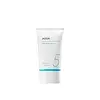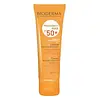What's inside
What's inside
 Key Ingredients
Key Ingredients

 Benefits
Benefits

 Concerns
Concerns

 Ingredients Side-by-side
Ingredients Side-by-side

Water
Skin ConditioningPropanediol
SolventEthylhexyl Salicylate
UV AbsorberHomosalate
Skin ConditioningDibutyl Adipate
EmollientBis-Ethylhexyloxyphenol Methoxyphenyl Triazine
Skin ConditioningMethylene Bis-Benzotriazolyl Tetramethylbutylphenol
UV FilterCaprylyl Methicone
Skin ConditioningPolysilicone-15
UV FilterDiethylamino Hydroxybenzoyl Hexyl Benzoate
UV FilterSodium Hyaluronate
Humectant1,2-Hexanediol
Skin ConditioningPentylene Glycol
Skin ConditioningPoly C10-30 Alkyl Acrylate
Emulsion StabilisingGlycerin
HumectantBehenyl Alcohol
EmollientPolyglyceryl-3 Methylglucose Distearate
EmulsifyingVp/Eicosene Copolymer
Octadecane
EmollientLactic Acid/Glycolic Acid Copolymer
Skin ConditioningTromethamine
BufferingDecyl Glucoside
CleansingCarbomer
Emulsion StabilisingAcrylates/C10-30 Alkyl Acrylate Crosspolymer
Emulsion StabilisingSodium Stearoyl Glutamate
CleansingEthylhexylglycerin
Skin ConditioningPolyacrylate Crosspolymer-6
Emulsion StabilisingSodium Polyacrylate
AbsorbentXanthan Gum
EmulsifyingPolyether-1
Caprylyl Glycol
EmollientT-Butyl Alcohol
PerfumingGuaiazulene
AntimicrobialGlyceryl Glucoside
HumectantTocopherol
AntioxidantBeta-Glucan
Skin ConditioningHydrolyzed Hyaluronic Acid
HumectantSodium Acetylated Hyaluronate
HumectantParfum
MaskingWater, Propanediol, Ethylhexyl Salicylate, Homosalate, Dibutyl Adipate, Bis-Ethylhexyloxyphenol Methoxyphenyl Triazine, Methylene Bis-Benzotriazolyl Tetramethylbutylphenol, Caprylyl Methicone, Polysilicone-15, Diethylamino Hydroxybenzoyl Hexyl Benzoate, Sodium Hyaluronate, 1,2-Hexanediol, Pentylene Glycol, Poly C10-30 Alkyl Acrylate, Glycerin, Behenyl Alcohol, Polyglyceryl-3 Methylglucose Distearate, Vp/Eicosene Copolymer, Octadecane, Lactic Acid/Glycolic Acid Copolymer, Tromethamine, Decyl Glucoside, Carbomer, Acrylates/C10-30 Alkyl Acrylate Crosspolymer, Sodium Stearoyl Glutamate, Ethylhexylglycerin, Polyacrylate Crosspolymer-6, Sodium Polyacrylate, Xanthan Gum, Polyether-1, Caprylyl Glycol, T-Butyl Alcohol, Guaiazulene, Glyceryl Glucoside, Tocopherol, Beta-Glucan, Hydrolyzed Hyaluronic Acid, Sodium Acetylated Hyaluronate, Parfum
Water
Skin ConditioningDicaprylyl Carbonate
EmollientOctocrylene
UV AbsorberMethylene Bis-Benzotriazolyl Tetramethylbutylphenol
UV FilterButyl Methoxydibenzoylmethane
UV AbsorberBis-Ethylhexyloxyphenol Methoxyphenyl Triazine
Skin ConditioningCyclomethicone
EmollientC20-22 Alkyl Phosphate
EmulsifyingGlyceryl Stearate
EmollientPEG-100 Stearate
Ectoin
Skin ConditioningMannitol
HumectantXylitol
HumectantRhamnose
HumectantFructooligosaccharides
HumectantLaminaria Ochroleuca Extract
Skin ConditioningC20-22 Alcohols
Emulsion StabilisingDecyl Glucoside
CleansingHydroxyethyl Acrylate/Sodium Acryloyldimethyl Taurate Copolymer
Emulsion StabilisingPentylene Glycol
Skin ConditioningXanthan Gum
EmulsifyingPropylene Glycol
HumectantCitric Acid
BufferingCaprylic/Capric Triglyceride
MaskingDisodium EDTA
Sodium Hydroxide
BufferingChlorphenesin
AntimicrobialPhenoxyethanol
PreservativeWater, Dicaprylyl Carbonate, Octocrylene, Methylene Bis-Benzotriazolyl Tetramethylbutylphenol, Butyl Methoxydibenzoylmethane, Bis-Ethylhexyloxyphenol Methoxyphenyl Triazine, Cyclomethicone, C20-22 Alkyl Phosphate, Glyceryl Stearate, PEG-100 Stearate, Ectoin, Mannitol, Xylitol, Rhamnose, Fructooligosaccharides, Laminaria Ochroleuca Extract, C20-22 Alcohols, Decyl Glucoside, Hydroxyethyl Acrylate/Sodium Acryloyldimethyl Taurate Copolymer, Pentylene Glycol, Xanthan Gum, Propylene Glycol, Citric Acid, Caprylic/Capric Triglyceride, Disodium EDTA, Sodium Hydroxide, Chlorphenesin, Phenoxyethanol
 Reviews
Reviews

Ingredients Explained
These ingredients are found in both products.
Ingredients higher up in an ingredient list are typically present in a larger amount.
You might know this ingredient as Tinosorb S or Bemotrizinol. It is a UV filter that covers both UVA and UVB rays.
This ingredient has two peak UV absorption peaks ( 310 and 340 nm) and is able to absorb both UV-A and UV-B rays. This ingredient works by preventing UV rays from reaching and damaging your skin.
On top of that - it is highly photostable and helps prevent the photodegration of other sunscreen ingredients such as avobenzone.
Tinosorb S is allowed in the EU, Australia, and Asia. It is close to being approved by the FDA and we'll hopefully get this ingredient in the U.S. by late 2025.
Fun fact: Tinosorb S is the most effective UV absorber at maximum concentration (measured by SPF) permitted in the EU.
This ingredient is oil-soluble, so your oil-cleansers will take this right off at night.
Learn more about Bis-Ethylhexyloxyphenol Methoxyphenyl TriazineDecyl Glucoside is a glucose-based surfactant and emulsion stabilizer. It is created by reacting glucose with the fatty acids from plants.
Surfactants help clean the skin by trapping oil, sebum, and dirt to be washed away. As an emulsion stabilizer, it stabilizes the ingredients in a product by preventing them from separating.
This ingredient is biodegradable and non-toxic. This ingredient is commonly found in baby shampoos.
Decyl Glucoside is sometimes used to stabilize the UV filter Tinosorb.
Learn more about Decyl GlucosideMethylene Bis-Benzotriazolyl Tetramethylbutylphenol (Tinosorb M) is a hybrid and broad-spectrum UV ingredient. It is both a UV absorber and filter.
UV absorbers are an agent that absorbs UV rays. They protect your skin by using chemical reactions to convert UV rays into heat and energy. UV filters physically reduce the amount of UV rays from reaching your skin.
Tinosorb M covers a range of 280-400 nm and is photostable. This ingredient is neither oil or water soluble.
Tinosorb M is not available in the US. However, it is available in the EU and Asia.
It's sister, Tinosorb S, is set to be approved in the US by late 2025 (fingers crossed!).
Learn more about Methylene Bis-Benzotriazolyl TetramethylbutylphenolPentylene glycol is typically used within a product to thicken it. It also adds a smooth, soft, and moisturizing feel to the product. It is naturally found in plants such as sugar beets.
The hydrophilic trait of Pentylene Glycol makes it a humectant. As a humectant, Pentylene Glycol helps draw moisture from the air to your skin. This can help keep your skin hydrated.
This property also makes Pentylene Glycol a great texture enhancer. It can also help thicken or stabilize a product.
Pentylene Glycol also acts as a mild preservative and helps to keep a product microbe-free.
Some people may experience mild eye and skin irritation from Pentylene Glycol. We always recommend speaking with a professional about using this ingredient in your routine.
Pentylene Glycol has a low molecular weight and is part of the 1,2-glycol family.
Learn more about Pentylene GlycolWater. It's the most common cosmetic ingredient of all. You'll usually see it at the top of ingredient lists, meaning that it makes up the largest part of the product.
So why is it so popular? Water most often acts as a solvent - this means that it helps dissolve other ingredients into the formulation.
You'll also recognize water as that liquid we all need to stay alive. If you see this, drink a glass of water. Stay hydrated!
Learn more about WaterXanthan gum is used as a stabilizer and thickener within cosmetic products. It helps give products a sticky, thick feeling - preventing them from being too runny.
On the technical side of things, xanthan gum is a polysaccharide - a combination consisting of multiple sugar molecules bonded together.
Xanthan gum is a pretty common and great ingredient. It is a natural, non-toxic, non-irritating ingredient that is also commonly used in food products.
Learn more about Xanthan Gum